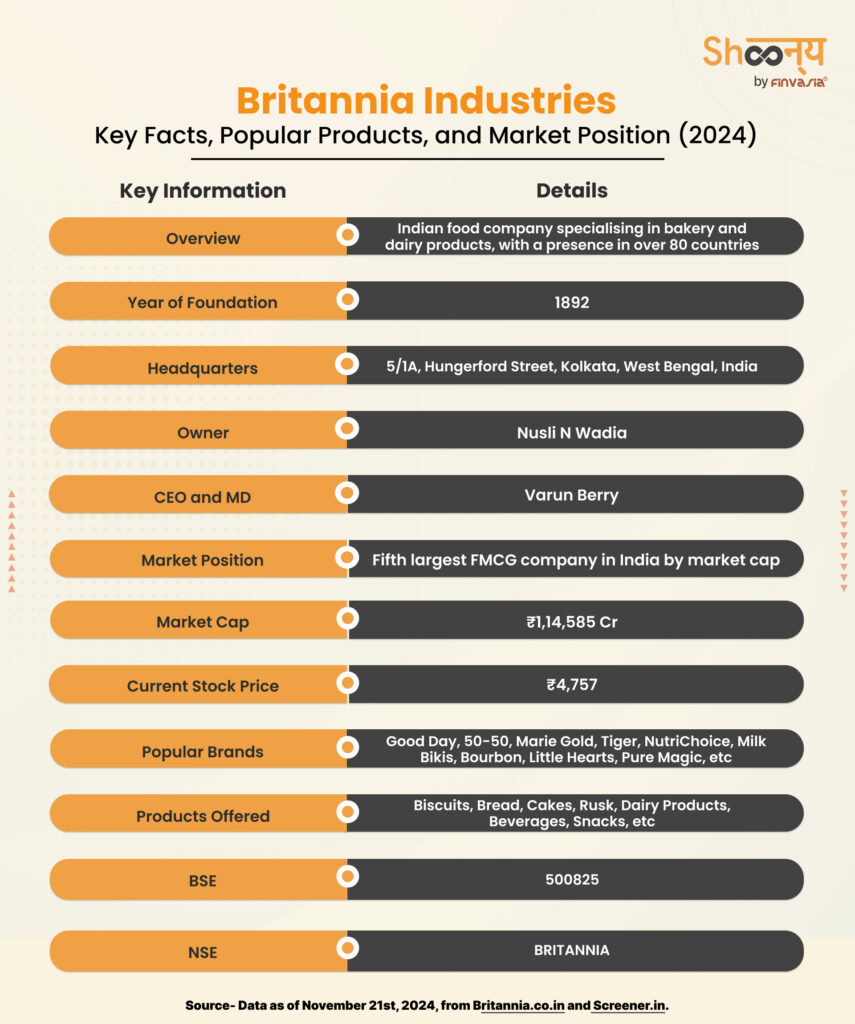Britannia Industries: From Biscuits to Bakery, They’ve Been There for You!
Today, let’s take a step back in time and travel to the year when Britannia Industries, the name loved by millions around the globe, began its journey.
If you are an ’80s or ’90s kid, do you remember those Britannia Bikis Classic, sugar-coated little hearts, and those fruit cakes? They were a bit pricey, but our parents still got them for us as bait so we would not miss school.
Even Generation X (before the ’80s) has been cherishing Britannia products.
Let us talk about the bakery giant behind the most-loved cakes, cashew cookies, milk cookies, and more: Britannia Industries Limited!
Britannia Industries History- Biscuits, Bread, and Beyond
The Britannia owner, Nusli Wadia, has been at the core of Britannia Industries.
Here is how the now most loved household biscuit and bakery brand has grown over the span of 130 years.
The Sweet Beginnings (1892-1900s)
This chapter takes you back to the early days when Britannia biscuits were just the beginning.
Founded in 1892, Britannia started as a small biscuit-making company in Kolkata, India,
A bunch of Britishers in Kolkata decided to start something sweet, which was later named Britannia Industries.
Did you know they kicked off the whole venture with just Rs. 295?
It’s hard to believe that they started what became a giant biscuit company with such a small amount of money! Initially, they baked biscuits, cakes, and bread, mainly for British officers and tea planters in India.
Wartime Heroes and Post-Independence Challenges (1910-1947)
From supplying service biscuits to the Indian Army during the Second World War to facing challenges post-independence, this era was special.
As the years rolled on, in 1918, Britannia became a public limited company. And thus, came the name Britannia Biscuit Company Limited.
Britannia achieved a milestone by becoming the first company east of the Suez Canal to utilise imported gas ovens. Their business was thriving.
During the Second World War – Britannia supplied biscuits to the Indian Army and even set up a training centre for disabled soldiers.
That was like turning biscuits into a force for good!
In 1924, Britannia established a new factory in Mumbai. During the same year, the company became a subsidiary of Peek Frean & Company Limited UK, a prominent biscuit manufacturing company.
Post Independence Era
After India got its independence in 1947, things got tricky.
There were challenges left and right! There was partition, shortages of raw materials, and tough competition from other biscuit makers.
But did Britannia back down?
No way!
By 1965, Britannia opened a new bakery in Delhi to meet the growing demand for their bread.
Then, in 1975, they took over the task of delivering biscuits from Parry’s. 1976 saw Britannia’s reach grow as they began selling their bread in both Calcutta and Chennai.
Two years later, in 1978, Britannia invited people to buy shares, and to their delight, Indians responded eagerly.
In 1979, Britannia made a significant move by changing its name from Britannia Biscuit Company Limited to Britannia Industries Limited!
The ’90s Shake-Up and Total Foods Vision (1990s-2000s)
As India’s economy opened up, Britannia faced new challenges.
This part of the story unfolds the ’90s shake-up, marking the journey towards becoming a total foods company.
The ’90s brought big changes when the Indian economy opened up.
More companies entered the bakery market, and Britannia Industries had to step up its game, too.
To make that happen, they shook things up – a new look, a new mindset, and an all-new Britannia products list. It included names like Tiger, NutriChoice, Little Hearts, and 50-50.
And guess what?
They were ranked among India’s most trusted brands.
Growth, Innovation, and Beyond (2000s-Present)
In 2000, they hit a whopping Rs 1000 crore in turnover – that’s like rolling in biscuit dough!
In 2022, Britannia entered a joint venture with French cheese maker Bel Group. They opened a cheese manufacturing plant in Maharashtra in October 2024.
Britannia has partnered with Accenture to modernise its business operations through digital transformation. This includes enhanced data visibility, automation, and analytics.
Not only this, Britannia has launched AI-powered campaigns and platforms such as NutriChoice’s diet planning chatbot and NutriPlus app to promote health and nutrition.
Britannia’s story continues.– Britannia Industries is still baking up a storm.
They’ve added more goodies to their lineup – cakes, rusk, croissants, milkshakes, and even coconut water.
About Britannia Industries
Britannia Industries is currently ranked fifth among the top FMCG companies based on market capitalisation. Over the years, it has transformed from a small bakery to one of the top 10 FMCG companies in India!
According to the latest information, Britannia displays strong financial numbers.

Here is a look at the Britannia Industries’ Q2 2024 Results
- Sales for the Quarter: ₹4,566 Crores
- Profit After Tax (PAT): ₹531 Crores
- Six-Month Performance:
- Sales Growth (YoY): 4.3% increase
- PAT Decline (YoY): 0.8% decrease
What’s the latest happening at Britannia?
Mr. Varun Berry, the Vice Chairman & Managing Director, shared a few key highlights:
- Despite inflation and rising costs, Britannia saw about 8% growth in volume.
- Britannia maintained a healthy 15.5% margin by adjusting prices and cutting costs.
- Britannia’s new products, like croissants, milkshakes, and wafers, are doing good. The company is also seeing good growth internationally.
- They’re improving their distribution system across 25 cities, focusing on reaching more stores and growing their market share.
Britannia Products List
Britannia Industries provides a variety of food products, including biscuits, breads, cakes, rusk, dairy products, beverages, and snacks. Some of its popular brands include Good Day, 50-50, Marie Gold, Tiger, NutriChoice, Milk Bikis, Bourbon, Little Hearts, Pure Magic, and Cheese.
Britannia Industries Limited: Charting a Responsible Future
They’re cooking up new ways to be eco-friendly and caring for folks.
So, what’s Britannia’s vision for the future?
To be a responsible global total foods company, serving up exciting goodness all day long with all these finger-licking Britannia products list:
• Biscuits: Britannia is one of the leading biscuit manufacturers in India, with popular brands such as Good Day, 50-50, Marie Gold, Tiger, NutriChoice, Milk Bikis, Bourbon, Nice Time, and Little Hearts. Britannia biscuits are available in various categories, such as cookies, crackers, cream, health, and treats.
• Bread: Britannia breads include wheat bread, multigrain bread, fruit bread, sandwich bread, pav, bun, and kulcha. They are made from premium ingredients and are enriched with essential nutrients.
• Cakes: Britannia cakes include fruit cake, nut & raisin cake, chocolate cake, muffin, cupcake, and brownie.
• Rusk: Britannia rusk is a crispy and crunchy snack made from wheat flour, sugar, and butter and comes in different flavours such as elaichi, milk, and suji toast.
• Dairy: Britannia dairy products include cheese, butter, ghee, dahi, milk, and beverages and are made from fresh and pure milk, offering a range of benefits such as calcium, protein, and probiotics.
• Snacks: Britannia snacks are tasty and convenient, suitable for enjoyment anytime, anywhere. Britannia snacks include wafers, salted snacks, and nuts.
How Britannia Industries Ltd is Combining Taste, Health, and Responsibility
At Britannia, they believe in creating a better world that drives their Corporate Social Responsibility (CSR) initiatives. Focused on sustainability, improving lives, and giving back to communities, Britannia is dedicated to making a positive impact in four key areas: Governance, People, Resources, and Growth.
The Britannia Nutrition Foundation (BNF) is one of the company’s most powerful initiatives to combat malnutrition in India.
Highlights of Britannia’s CSR Initiatives:
- Sustainability in Energy
60% of Britannia’s energy comes from renewable sources like wind and solar. Their factories are designed to use clean fuels and energy-efficient ovens, further reducing their environmental footprint.
- Promoting Diversity & Inclusion
As of 2024, 39% of Britannia’s factory workforce are women, and 20% of senior management positions are held by women, ensuring a more inclusive workplace.
- Improving Nutrition
The company continues to enhance the nutritional value of its food by adding healthy ingredients and focusing on immunity-boosting options.
- Fighting Malnutrition
Through community programs, Britannia has reached 62,587 malnourished people, helping 94% of malnourished children return to a healthy status.
- Supporting Local Communities
Britannia has trained 400 women in dairy farming.
Through its Responsible Goodness framework, Britannia ensures that every step they take today contributes to a healthier, more sustainable future for generations to come.
And that is the story of Britannia – from a little biscuit house in Kolkata to a snacking sensation loved by all.
FAQs| Britannia Industries History
Britannia’s product list includes bakery and dairy items like biscuits, bread, cakes, rusk, cheese, milk, butter, ghee, and yoghurt. Popular brands from Britannia include Good Day, Marie Gold, Tiger, NutriChoice, Milk Bikis, and Britannia Cheese.
No, Parle and Britannia are different companies in the Indian biscuit and bakery market. Parle is a family-run business, while Britannia is a public limited company.
Britannia is headquartered in Kolkata, India. It was established in 1892 by a group of British businessmen and later acquired by the Wadia Group in the early 1990s.
Yes, Britannia is the fifth largest FMCG company in India, known for offering a wide range of food products like biscuits, dairy, and snacks.
Britannia owns popular brands like Good Day, Tiger, NutriChoice, Milk Bikis, Marie Gold, and Treat, which are loved by consumers across India.
As of Nov 22nd, 2024, Britannia is ranked among the top 10 FMCG companies in India.
Britannia’s success is driven by its strong brand reputation, wide product range, and commitment to consistent quality.
Source- britannia.co.in
______________________________________________________________________________________
Disclaimer: Investments in the securities market are subject to market risks; read all the related documents carefully before investing.

